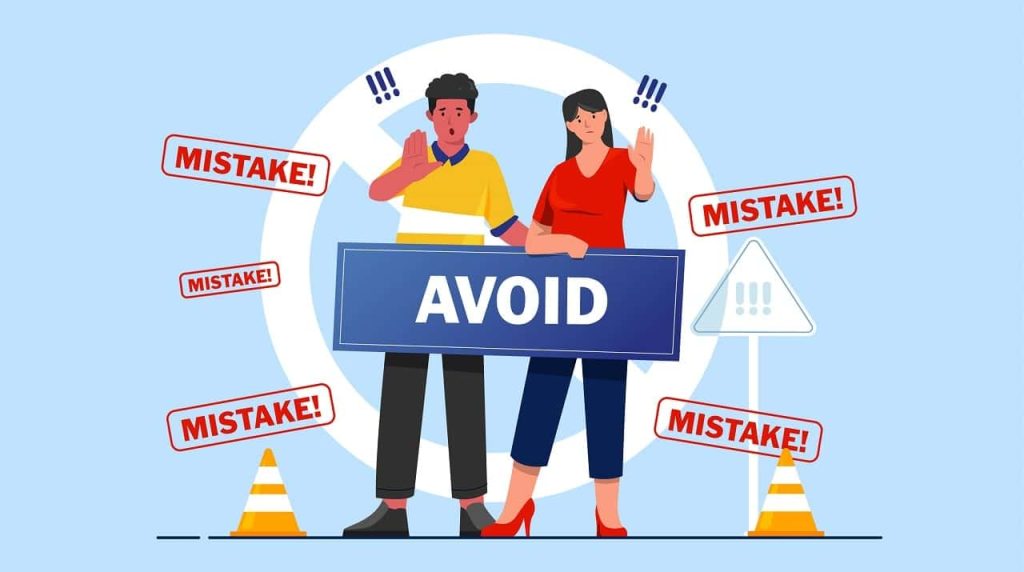Planning an event requires meticulous attention to detail, and avoiding common event planning mistakes is key to ensuring a seamless experience for everyone involved. Whether organizing a corporate conference, trade show, or gala, knowing what to watch out for can make all the difference. Here are ten event planning mistakes you should avoid to guarantee a flawless event.
1. Neglecting an Event Planning Cost Estimator
One of the biggest common pitfalls in event management is failing to use an event planning cost estimator to gauge expenses properly. Without a clear financial plan, unexpected costs can arise, impacting other crucial elements of your event. Using an estimation tool ensures all aspects of your budget are accounted for, preventing overspending or last-minute financial stress.
A detailed event budget should cover:
- Venue and Logistics Rental fees, permits, and transportation costs.
- Technology and AV Needs Investing in quality event audio-visual solutions for presentations, lighting, and sound.
- Marketing and Promotion Social media ads, email campaigns, and event branding materials.
- Catering and Entertainment Food, beverages, and guest speakers or performers.
- Staffing and Security Payments for team members, security personnel, and on-site support.
- Contingency Fund Setting aside extra funds for unforeseen expenses or emergencies.
Without an accurate cost estimator, organizers often underestimate critical expenses, leading to budget shortfalls. This can affect the attendee experience, limit networking opportunities, and force last-minute cuts that compromise the quality of your event.
To avoid these financial setbacks:
- Use Budgeting Software or Tools These help forecast costs and track real-time expenses.
- Plan for Inflation or Vendor Changes Costs can fluctuate, so it’s best to allocate a buffer.
- Regularly Review and Adjust A cost estimator isn’t a one-time tool it should be revisited throughout the event planning process.
Proper financial planning through a cost estimator ensures a budget-friendly event while maintaining high-quality standards for your future events.
2. Overlooking a Contingency Fund for Emergencies
A well-structured contingency plan is vital to handling unexpected issues. Many event planners make the mistake of creating a budget that only covers expected costs, leaving no room for unforeseen circumstances such as.
- Weather Disruptions Outdoor events can be affected by sudden rain, strong winds, or extreme temperatures, requiring last-minute rentals like tents or heaters.
- Vendor Cancellations or No-Shows Caterers, photographers, or equipment providers may back out, requiring urgent replacements at a premium price.
- Technical Failures Sound system malfunctions, Wi-Fi connectivity issues, or power outages can disrupt the event, necessitating backup solutions.
- Unexpected Guest Increases Higher-than-anticipated attendance may require additional seating, food, or security.
- Permit or Compliance Issues Last-minute changes in regulations might demand additional permits or compliance measures.
To avoid these setbacks, allocate 10-20% of your total budget to a contingency fund. This financial cushion ensures that your event remains on track without compromising quality or the attendee experience.
How to Manage a Contingency Fund Effectively:
- Identify High-Risk Areas Assess which aspects of the event are most likely to face unexpected costs, such as event audio-visual setups, catering, or venue adjustments.
- Prioritize Flexibility Work with vendors that offer flexible contracts, allowing modifications without hefty penalties.
- Monitor Expenses Closely Track spending throughout the event planning process to ensure the contingency fund remains intact for actual emergencies.
- Have Backup Plans in Place – Prepare alternatives in advance, such as an indoor venue option for outdoor events or secondary vendors on standby.
Failing to plan for unexpected expenses can turn a minor inconvenience into a major crisis. A properly managed contingency fund ensures your event runs smoothly, even in the face of last-minute surprises.
3. Not Prioritizing Event Audio Visual Needs
Quality event audio-visual (AV) solutions are crucial for delivering a professional and engaging event experience. Poor lighting, sound failures, or inadequate projection equipment can negatively impact presentations, speeches, and performances, leaving attendees frustrated and disengaged.
Common AV Mistakes to Avoid
- Inadequate Sound System Poor speaker placement, weak microphones, or volume imbalances can make it difficult for attendees to hear speakers or entertainment.
- Insufficient Lighting Bad lighting can create an unprofessional atmosphere, affect video recordings, and reduce visibility for both in-person and virtual attendees.
- Technical Failures & Last-Minute Fixes Without proper planning and AV testing, unexpected issues like faulty projectors, dead microphone batteries, or Wi-Fi connectivity problems can disrupt your event.
- Ignoring Virtual & Hybrid Event Needs If your event includes remote attendees, failing to provide proper live streaming, high-quality cameras, and clear audio can result in a poor virtual experience.
How to Avoid AV Pitfalls
- Work with Experienced AV Professionals Partner with experts to assess venue acoustics, equipment needs, and optimal setups.
- Conduct AV Consultations & Rehearsals Schedule pre-event AV consultations to test microphones, projectors, screens, and other equipment to prevent technical failures.
- Invest in Backup Equipment Have spare microphones, cables, and additional lighting on hand to resolve unexpected failures quickly.
- Optimize AV for the Venue Consider room size, seating arrangements, and potential obstructions when setting up sound and visuals.
- Plan for Live Streaming & Hybrid Events Ensure your AV setup supports seamless virtual broadcasting with high-quality audio and video.
A well-executed event audio-visual setup enhances engagement, professionalism, and overall event success. By prioritizing AV needs early in the event planning process, you can create a seamless experience that impresses attendees and avoids costly last-minute mishaps.
4. Underestimating the Importance of Social Media Promotion
An event’s success depends on strategic marketing, and failing to leverage social media is a missed opportunity. From pre-event buzz to real-time updates and post-event engagement, digital platforms help reach a wider audience, increase ticket sales, and enhance networking opportunities.
A strong social media strategy includes:
- Creating event pages on platforms like Facebook and LinkedIn
- Using hashtags to increase visibility
- Engaging with attendees through live streaming and behind-the-scenes content
- Encouraging attendees to share their experiences through posts and stories
Social media is a powerful tool for driving engagement and attendance, making it a crucial aspect of the event planning process.
5. Ignoring Attendee Experience and Engagement
Creating memorable event experiences requires more than just good planning; it requires a focus on the audience. Neglecting elements like comfortable seating, engaging activities, and accessible networking spaces can reduce the overall impact of your event. Ensuring a well-thought-out attendee experience will encourage guests to return for future events.
Attendee engagement strategies include:
- Interactive Q&A sessions
- Live polls and surveys
- Dedicated networking areas
- Engaging keynote speakers and entertainment
Ensuring that guests feel valued and engaged throughout the event makes a lasting impression and increases their likelihood of participating in future events.
6. Failing to Streamline Team Members’ Roles
A well-coordinated team is the backbone of a successful event. When team members are unsure of their roles, tasks can overlap, critical responsibilities may be neglected, and last-minute confusion can lead to inefficiencies. A disorganized team can result in delays, communication breakdowns, and increased stress on the day of the event.
Common Team Management Mistakes
- Lack of Clear Roles & Responsibilities Without clearly defined duties, team members may duplicate efforts or overlook key tasks.
- Ineffective Communication Miscommunication between event staff, vendors, or stakeholders can cause unnecessary delays and mistakes.
- Last-Minute Role Assignments Assigning responsibilities too late can leave team members unprepared to handle their duties effectively.
- No Chain of Command When issues arise, a lack of leadership structure can make problem-solving difficult and inefficient.
How to Avoid These Pitfalls
- Create a Detailed Event Plan Outline all tasks required for the event and assign clear responsibilities to each team member well in advance.
- Use Event Management Tools Platforms like Trello, Asana, or event-specific software to help streamline task assignments and deadlines.
- Conduct Pre-Event Training & Briefings Ensure that everyone understands their role and how their tasks contribute to the event’s success.
- Establish a Chain of Command Designate point persons for specific areas (e.g., registration, AV, catering) to streamline problem-solving.
- Encourage Team Collaboration Open communication channels, such as team chats or scheduled check-ins, to keep everyone aligned and ready to adapt to any last-minute changes.
By streamlining team roles and ensuring everyone is prepared, you create a well-organized event that runs smoothly from start to finish. Proper delegation and communication eliminate confusion, enhance productivity, and contribute to a flawless event experience.
7. Overbooking or Underbooking the Venue
Choosing the wrong venue size is a common pitfall in event planning. An overcrowded space creates discomfort, while an excessively large venue can feel empty and uninspiring. Consider guest count, event format, and venue logistics when making your decision to create the right atmosphere.
Ensure that your venue aligns with your event objectives, accessibility needs, and technological requirements. Conducting a thorough site visit before finalizing the venue helps mitigate space-related issues.
8. Disregarding Post Event Evaluation
The event planning process doesn’t end when the event is over. Many organizers fail to conduct a thorough post-event analysis to assess successes and areas for improvement. Gathering feedback from attendees, sponsors, and team members provides valuable insights for planning even better future events.
Post-event evaluation should include:
- Surveys and feedback forms
- Reviewing key performance indicators (KPIs) such as attendance rates and engagement
- Analyzing social media impressions and post-event interactions
- Team debriefings to discuss what worked and what didn’t
Learning from past events helps refine strategies for future planning, making each event more successful than the last.
9. Neglecting Ticket Sales and Registration Logistics
A smooth ticket sales and registration process is essential for ensuring a seamless check-in experience and reducing attendee frustration. A poorly managed registration system can result in long lines, delays, and even lost ticket revenue.
Common Registration Mistakes to Avoid
- Complicated Sign-Up Forms Lengthy or confusing forms can discourage potential attendees from completing their registration.
- Limited Payment Options Not offering multiple payment methods can result in lost sales.
- Slow or Disorganized Check-In Process Long wait times at entry points can cause frustration and negatively impact the event experience.
- Lack of Real-Time Attendance Tracking Without a streamlined system, it’s difficult to monitor attendee numbers and manage capacity effectively.
How to Improve Ticketing and Registration
- Using Reliable Ticketing Platform Services like Eventbrite, Ticketmaster, or custom event software can simplify the sales process and ensure secure transactions.
- Offer Multiple Payment Options Accepting credit cards, digital wallets, and PayPal increases accessibility.
- Implement Digital Ticketing & QR Code Check-Ins These reduce wait times and streamline entry with quick scanning solutions.
- Provide On-Site Registration Support A dedicated check-in team can handle last-minute ticket issues and assist guests efficiently.
- Send Automated Reminders & Confirmations Email or SMS notifications to keep attendees informed and reduce no-shows.
By prioritizing an efficient registration system, you enhance the attendee experience while ensuring a stress-free event entry process. Proper planning in this area leads to better organization, increased attendance, and a more professional event execution.
10. Skipping AV Consultations and Event Management Support
Attempting to handle technical requirements without professional AV consultations can lead to avoidable mistakes. High-quality event audio-visual support is essential for ensuring your event runs smoothly. Partnering with experts in event management can help prevent last-minute mishaps and ensure your setup meets professional standards.
AV consultations help you:
- Choose the best equipment for your venue size and audience needs
- Plan for backup systems to prevent technical failures
- Ensure seamless transitions between speakers and presentations
Investing in expert AV support eliminates unnecessary stress and guarantees professional event execution.
Why Choose Global Audio Visual for This Service?
At Global Audio Visual, we understand that successful event execution requires more than just great planning it demands top-tier audio-visual solutions, seamless logistics, and expert support to ensure a flawless experience. Whether you’re organizing a corporate event, trade show, gala, or private gathering, our team is dedicated to enhancing your event with cutting-edge technology and professional expertise.
What Sets Us Apart?
Comprehensive AV Solutions From sound systems and lighting to visual displays and live streaming, we provide state-of-the-art equipment tailored to your event’s needs.
Expert AV Technicians Our experienced team ensures seamless setup, operation, and troubleshooting, so you never have to worry about technical issues disrupting your event.
Personalized Consultation & Support We work closely with you from start to finish, offering custom AV consulting and pre-event walkthroughs to guarantee optimal execution.
Reliable Backup Plans Unforeseen challenges can arise, but with our contingency plans and backup equipment, your event will run smoothly no matter what.
Enhancing Attendee Experience Our advanced audio-visual solutions ensure clear sound, stunning visuals, and engaging presentations, creating a memorable experience for your audience.
End-to-End Event Support From registration logistics to AV management, we streamline your event planning process so you can focus on delivering a successful event.
Partner with Global Audio Visual for a Flawless Event
With a strong reputation for excellence and a commitment to innovation, Global Audio Visual is your trusted partner in delivering high-quality, stress-free event production services. Let us handle the technical details while you focus on making an impact.
Ready to take your event to the next level? Contact us today to discuss your AV needs!
Conclusion
Avoiding common event planning mistakes is crucial for executing a successful event. From budgeting wisely with an event planning cost estimator to focusing on event audio-visual quality and attendee engagement, careful planning ensures a seamless experience. By partnering with experts like Global Audio Visual, you can enhance the event planning process and create impactful future events. Proper planning, professional support, and strategic engagement guarantee a truly memorable and flawless event.





